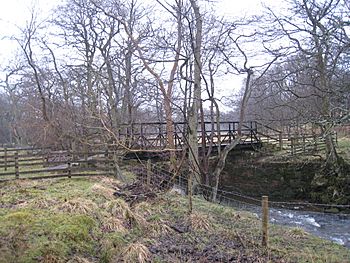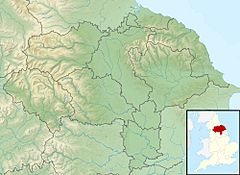River Seph facts for kids
Quick facts for kids River Seph |
|
|---|---|

Footbridge over the River Seph
|
|
|
Location within North Yorkshire
|
|
| Physical characteristics | |
| Main source | Chop Gate 520 feet (160 m) 54°23′10″N 1°08′27″W / 54.386121°N 1.140853°W |
| River mouth | Seph Mouth 54°17′28″N 1°08′46″W / 54.291175°N 1.146138°W |
| Length | 13 miles (20.5 km) |
| Basin features | |
| Tributaries |
|
The River Seph (also called the River Sep) is a river in North Yorkshire, England. It flows into the River Rye, which then flows into the River Derwent. The River Seph is about 13 miles (20.5 km) long. It flows through a valley called Bilsdale and joins the River Rye near the village of Hawnby. The name Seph comes from an old Swedish word meaning Slow Stream or Calm. Long ago, when the land belonged to Roger de Mowbray, the river was known as the Sep.
Where the River Seph Flows
The River Seph begins in Bilsdale at a village called Chop Gate. Here, two smaller streams, Bilsdale Beck and Raisdale Beck, meet to form the river. Some of its water also comes from Urra Moor. From its start to where it meets the River Rye, the river is about 13 miles long. In the past, parts of the river were used as borders between old local areas.
Bilsdale valley is narrow and has many trees at its beginning. But as the river flows further down, the valley gets wider. The river then starts to curve and wind before it joins the River Rye.
Nature and Wildlife Along the Seph
The River Seph has faced problems with plants that are not native to the area. These include Himalayan balsam and Japanese knotweed. People have worked on projects to remove these plants. The river has also received money from the government to help fish move more easily and to reduce pollution.
In the late 1800s and early 1900s, the River Seph was known for having many trout. In 2015, different groups worked together to help fish travel better along the river. This allowed trout from the River Rye to swim up into the Seph.
The river flows along the edge of the North York Moors. Because of this, the ground beneath it is made of different types of rock, like limestone, gritstone, and mudstone. During very dry summers, the river's water can disappear into these rocks. This means the river flows completely underground for a while.
The sides of Bilsdale, where the Seph winds, are covered with old Oak trees. In 2017, the North York Moors National Park Authority received money to protect this land. They also plan to study the wildlife along the upper parts of the River Rye, which includes the River Seph. They will look for native animals like the alcathoe bat and the white-clawed crayfish that live near the water.
Villages Along the River Seph
Bilsdale is a quiet valley with mostly small groups of houses, not big towns. As you go downstream from where the River Seph starts, you will find these small settlements:
- Seave Green
- Chop Gate
- Cross Holme
- Fangdale Beck
 | Laphonza Butler |
 | Daisy Bates |
 | Elizabeth Piper Ensley |


